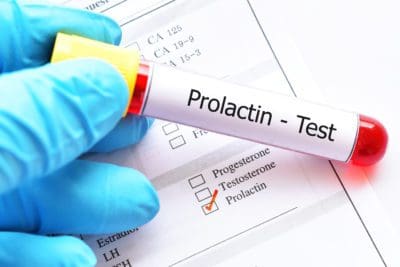The link between elevated prolactin and infertility
By naturopath Margaret Jasinska
Abnormally high levels of the hormone prolactin are a common cause of infertility, an irregular menstrual cycle and hair loss.
Prolactin is a hormone made by the anterior pituitary gland in the brain. The function of prolactin is to enhance breast development during pregnancy, and to induce lactation. However, all women and men make low levels of this hormone continually. The normal range for women is 85 – 500 mIU/L.
Elevated prolactin can cause anovulation (lack of ovulation), infrequent menstrual periods, a shortened luteal phase (second half of cycle) or a loss of menstruation altogether. The fact that prolactin usually inhibits ovulation explains why most women cannot fall pregnant while breastfeeding. If ovulation is inhibited, progesterone cannot be produced; therefore women end up being low in this vital hormone.
Depending on how high the prolactin level is, women may experience symptoms of a milky discharge from the breasts.


Cause of excess prolactin production
The following factors may predispose a woman to hyperprolactinaemia:
- Stress
- Some medication, particularly anti-depressants, opiates, cimetidine (used to suppress stomach acid), metoclopramide (used for nausea and vomiting), some anti-psychotic drugs and some antihistamines
- A small tumour in the pituitary gland of the brain
- Other pituitary or hypothalamic tumours interfering with dopamine production
- Women with polycystic ovarian syndrome often have mildly raised prolactin
- An underactive thyroid gland
- Strenuous exercise can temporarily raise prolactin.
Because stress can cause elevated prolactin, if you do have a slightly high reading on a blood test, it is important to have it rechecked, just in case stress caused a temporary elevation. A pituitary tumour causing excess prolactin secretion is called a prolactinoma. These tumours are usually benign (non-cancerous) and are mostly very small (known as a micro-adenoma). A CT scan or MRI can detect these tumours. An MRI is preferable because it does not expose the body to radiation.
The brain chemical dopamine is responsible for suppressing excess prolactin production; therefore anything that interferes with dopamine production can allow prolactin levels to escalate. Several of the medications listed previously cause hyperprolactinaemia because they reduce dopamine production. Sometimes prolactin levels only rise at night time and this makes it difficult to detect on a blood test. Women with elevated prolactin at night commonly experience breast tenderness in the week or so before a menstrual period.
Treatment of hyperprolactinaemia
If a pituitary tumour is producing excess prolactin, a prescription medication called bromocriptine (Parlodel or Kripton) is commonly used. This drug lowers prolactin levels, shrinks the pituitary tumour and restores regular ovulation and menstruation. It is best to start with a small dose of bromocriptine, as it can cause nausea and dizziness. The dose can be increased gradually until the prolactin level is normalised. Another medication called Cabergoline can also be used for the same purpose but it is not suitable for women wishing to become pregnant.
Fortunately it is often possible to reduce excess prolactin just with dietary changes and herbal medicine. We have found that eliminating all dairy products from the diet is very important for women with hyperprolactinaemia. The hormones found in dairy products may stimulate the pituitary gland to manufacture excess prolactin. Therefore all cow, goat and sheep milk should be avoided, along with foods that contain milk. It is also important to increase the quantity of antioxidants in your diet, through fresh vegetables, fruit and vegetable juices. Losing weight usually helps to get prolactin levels down.
There are some herbs that can help to lower prolactin. It is best to consult a naturopath or herbalist who will be able to prescribe the most appropriate herbs for you, at an effective dose. To maximise the chances of a successful and healthy pregnancy, plus a healthy child, it is best for both parents to focus on maximising their health before conception. Consider doing the Dr Cabot 15 Day Cleanse program to support healthy liver, gut and immune system function.
If your prolactin level is high enough to cause infrequent or absent menstruation then the use of a cream containing natural progesterone can reboot the hypothalamus- pituitary axis to send the right messages to your ovaries to get you ovulating again. This will help to bring back a regular menstrual cycle and relieve symptoms of premenstrual tension. For more information on progesterone see Dr Cabot’s excellent books titled Hormones – Don’t Let Them Ruin Your Life and How Not To Kill Your Husband
If you would like to make an appointment to see Margaret Jasinska, please email her or call our Camden Clinic on 02 4655 4666









Leave A Comment